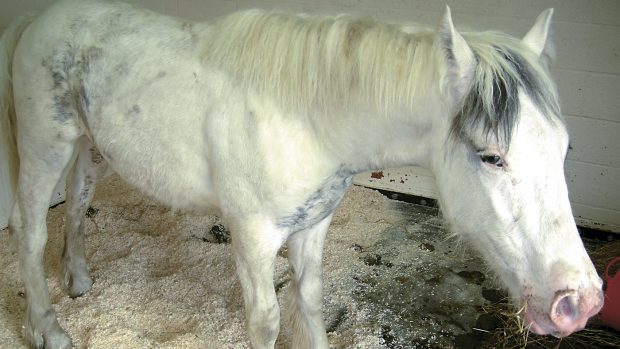Vets and horse owners are calling for more action to help combat equine flu after an increase in recorded cases this year. Sixty percent of Britain’s 900,000 horses are unvaccinated. Fellow owners are urging those who are complacent to protect their horse to stop the spread of the infection.
Since September there have been 24 outbreaks of flu in England and Scotland. The highly infectious virus is spread via coughing and nasal discharge.
However, it is possible that the disease is not more common than in past years — but that vets are now better at picking it up.
“We expect to see small outbreaks each year because it is endemic; however there has been an increased number of outbreaks this year compared to 2013,” said Debra Elton, head of virology at the Animal Health Trust (AHT).
“We are not yet sure whether this increase in reported outbreaks is due to enhanced activity or enhanced surveillance, although there have not been large numbers of horses affected and no mass breakdown in vaccination.”
Passport checks
“Some of the outbreaks have been linked to horses that travelled from Ireland. Despite this, there has been no evidence to confirm that the virus originated in Ireland,” added Debra.
“Most of the outbreaks in the UK are, however, linked with horse movement.”
Although under some competition rules vaccinations are mandatory, many events do not always check passports.
Julie Magnus of Julie Magnus Racehorse Transport told H&H she wants passport checks to be made “more stringent” and that she fears “thousands of owners are still unaware” of the dangers when travelling.
“Many people are making the decision not to inoculate whether due to costs or other reasons,” she said.
“Transporters are required to carry only the passports and although we would advise inoculation at all times we are not required to check if their horses’ jabs are up to date.
“We disinfect the lorry immediately if unvaccinated horses have been travelling,” she said.
“By travelling unvaccinated horses with companies that don’t check passports, owners could end up with vet bills for not only their horse, but also other liveries’ horses that may be affected,” she added.
Flu is is not a notifiable disease, which means that precautions such as quarantine are not mandatory.
H&H vet Karen Coumbe added: “If a new horse arrives at a yard it is always best to isolate it until you are confident it is healthy.
“I agree that transporters should be making checks as shared airspace and close contact — such as at shows or travelling — is when horses are at risk of being infected, like people on a plane or train.”
Vaccinate your horse
According to the AHT, nearly all of the outbreaks this year have affected horses that were either not vaccinated or whose vaccinations were not up to date.
“We want to make sure that people are aware that flu is present and encourage people to be vigilant — this means keeping up to date with vaccinations,” added Debra.
A new vaccine which includes the Clade 2 strain of the virus — which is prevalent this year — will be available shortly, having been developed over the past four years.
Richard Newton from the AHT added: “Equine flu, like the human and avian versions, is continually evolving and while we have perfectly good vaccines out there, some are becoming out of date.
“This year there is an increased amount of flu going around and when any new product comes on to the market it is a good step forward.”
➤ If you’re concerned that your horse might have flu, talk to your vet — they can take a swab which can be tested for the virus free of charge through the AHT’s equine influenza surveillance programme, which is funded by the Horserace Betting Levy Board.
Ref: Horse & Hound (4 December 2014)





